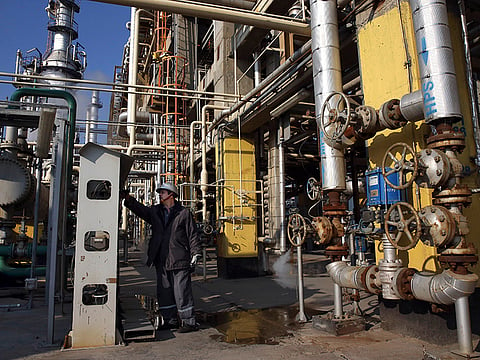Geopolitical premium seen on oil prices due to Iran unrest
Minimum impact expected on oil output from Iran

Abu Dhabi
Oil prices may rise further due to geopolitical risks associated with Iran protests, but the ongoing protests is not expected to impact oil production in the Islamic republic, analysts said.
Protests broke out in Iran during the weekend over rising inflation and unemployment with more than 20 people reported to have been killed, which is also third biggest producer of oil within the Opec (Organisation of the Petroleum Exporting Countries) block. The country has an estimated output of 3.8 million barrels per day, according Opec.
“We do see a spike in crude oil prices due to the geopolitical risk associated with the current public unrest in Iran. If the unrest spurs to the larger part of the country, we might see a larger surge in oil prices,” Avtar Sandu, senior manager of commodities in Singapore based Phillip Futures told Gulf News.
However, he ruled out the possibility of oil production getting disrupted due to the current situation in the country.
Oil prices have rallied on the back of Iran unrest as well as due to drawdown in the global oil inventories due to output cuts by oil producing countries in the early morning trading on Tuesday. Brent hit a May 2015 high of $67.29 per barrel on Tuesday whereas West Texas Intermediate surged to $60.74, the highest since June 2015.
Further rise in oil prices is expected in the first quarter. “We are expecting a rosier outlook for oil prices in the coming quarter. Stronger levels of support will be seen through Opec’s global inventory drawdown policies. The projected demand growth will assist to balance out the increase in US shale in the coming quarter,” added Sandu.
Stephen Brennock, a London-based analyst from brokerage firm PVM Oil Associates said the oil market is facing an increasingly potent geopolitical cocktail including the protests in Iran as well as Venezuela’s financial woes, tensions in the Korean peninsula and the scope for supply disruptions in Libya and Nigeria.
“The major source of price support will continue to be the ongoing production cuts by Opec, non-Opec members but the geopolitical premium could inject the energy complex with a sharp dose of bullish impetus,” he said.
Opec and non-Opec members led by Russia are cutting production by about 1.8 million barrels per day to lower global oil inventories and help support oil prices. The deal will expire at the end of 2018.
US oil production is also expected to impact oil prices in the coming days. US shale oil producers had been boosting output aggressively in tandem with oil prices although of late the US oil rig count as provided by Baker Hughes seems to have stabilised.
Sign up for the Daily Briefing
Get the latest news and updates straight to your inbox



